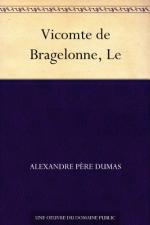The story of the Comte de Vermandois and the blow was treated as an absurd and romantic invention, which does not even attempt to keep within the bounds of the possible, by Baron C. (according to P. Marchand, Baron Crunyngen) in a letter inserted in the ’Bibliotheque raisonnee des Ouvrages des Savants de d’Europe’, June 1745. The discussion was revived somewhat later, however, and a few Dutch scholars were supposed to be responsible for a new theory founded on history; the foundations proving somewhat shaky, however,—a quality which it shares, we must say, with all the other theories which have ever been advanced.
According to this new theory, the masked prisoner was a young foreign nobleman, groom of the chambers to Anne of Austria, and the real father of Louis XIV. This anecdote appears first in a duodecimo volume printed by Pierre Marteau at Cologne in 1692, and which bears the title, ’The Loves of Anne of Austria, Consort of Louis xiii, with M. le C. D. R., the Real Father of Louis XIV, King of France; being a Minute Account of the Measures taken to give an Heir to the Throne of France, the Influences at Work to bring this to pass, and the Denoument of the Comedy’.
This libel ran through five editions, bearing date successively, 1692, 1693, 1696, 1722, and 1738. In the title of the edition of 1696 the words “Cardinal de Richelieu” are inserted in place of the initials “C. D. R.,” but that this is only a printer’s error everyone who reads the work will perceive. Some have thought the three letters stood for Comte de Riviere, others for Comte de Rochefort, whose ‘Memoires’ compiled by Sandras de Courtilz supply these initials. The author of the book was an Orange writer in the pay of William iii, and its object was, he says, “to unveil the great mystery of iniquity which hid the true origin of Louis XIV.” He goes on to remark that “the knowledge of this fraud, although comparatively rare outside France, was widely spread within her borders. The well-known coldness of Louis xiii; the extraordinary birth of Louis-Dieudonne, so called because he was born in the twenty-third year of a childless marriage, and several other remarkable circumstances connected with the birth, all point clearly to a father other than the prince, who with great effrontery is passed off by his adherents as such. The famous barricades of Paris, and the organised revolt led by distinguished men against Louis XIV on his accession to the throne, proclaimed aloud the king’s illegitimacy, so that it rang through the country; and as the accusation had reason on its side, hardly anyone doubted its truth.”
We give below a short abstract of the narrative, the plot of which is rather skilfully constructed:—




